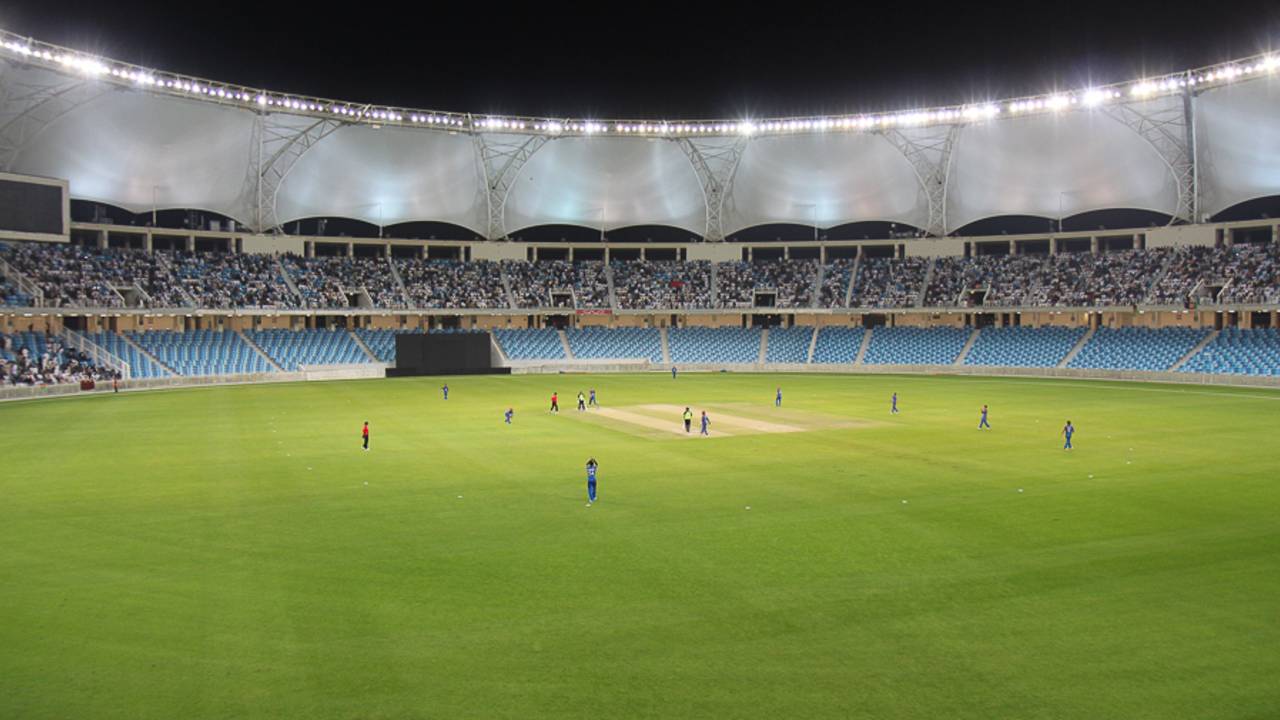How about a Full Member and TV next time
ESPNcricinfo picks out five talking points from the inaugural Desert T20 which was won by Afghanistan
Peter Della Penna
22-Jan-2017
The Desert T20 was a short, sharp well-run tournament and the teams wanted to win it • Peter Della Penna
1. No Papua New Guinea, No Problem
Of the Division One Associate countries, only Papua New Guinea declined an invitation to participate as the dates conflicted with most of their first-choice players appearing in the East Asia-Pacific squad at the Australian Country Championship. Those plans had been arranged well in advance while the Desert T20 was arranged at relatively short notice.
However, given the opportunity to participate in a future edition, it's doubtful that PNG would voluntarily skip it again. Though Namibia went winless, they provided stiff competition in their first two games, taking UAE down the last ball and Ireland into the final over. More than that, every team more or less brought their first choice squad and played at a high intensity level throughout regardless of there not being an ICC qualification or tournament spot up for grabs. The tipping point was Scotland's seven-run win over Netherlands as the Scots showed a total desperation to win. Scotland have been more vocal than most Associates about wanting more playing opportunities and were taking advantage of the current one on offer.
2. A Full Member or Two Wouldn't Hurt Though
The only carrot left to dangle in front of Associates that would make them even keener to come back would be the inclusion of Zimbabwe and one lower-ranked Full Members. Afghanistan are currently ranked ninth in the ICC's T20I rankings, ahead of both Zimbabwe and Bangladesh and though Bangladesh have traditionally been bunched together when discussing Full Member sides who aren't pulling their weight competing with the other Test nations, that is shifting thanks to Bangladesh's vast improvements in recent times.
Bangladesh qualified ahead of West Indies for the 2017 Champions Trophy and currently are in line for an automatic qualification spot for the 2019 World Cup too. T20 is a different kettle of fish but it wouldn't hurt for another team, whether it is Pakistan, Sri Lanka or Bangladesh to throw their hat into the ring.
3. The transformation of the Afghanistan fan base
At the 2010 World T20 Qualifier final in Dubai, more than 10,000 fans filled up Dubai International Stadium to be a part of history, getting a chance to witness Afghanistan win the tournament and move on to the 2010 World T20 in West Indies. The crowd that night seemed more there to support Afghanistan the country than Afghanistan the cricket team, with many seemingly first time fans cheering at awkward moments not entirely sure of what was happening.
Seven years later, the fan base has swelled in size and in knowledge. Those turning up throughout the tournament still have a peerless passion, literally seen walking through open stretches of desert without a form of transportation to get them to the stadium venues but determined to see their team play. But there is no doubting that they now also have a keen appreciation for the nuances of the game. It is best seen through the way they cheered Rashid Khan's spells, for even the wicketless moments were sensed for their excellence due to the impact he was having by building pressure. Afghanistan doesn't just have rabid cricket fanatics, but aficionados too.
4. Short and sweet
Fifteen games in seven days was a lot of cricket to squeeze into a week, but the ICC could learn a thing or two from how smoothly this tournament came off when the cricket is put first. Yes, it would have been great if these matches were televised, but commercial interests are the main reason why the World Cup is so bloated, extending to seven weeks despite having only two more teams.
Even the World T20 has morphed into a mini-marathon. The first one in 2007 lasted just two weeks while the most recent one in India was stretched into nearly twice that time at 27 days to squeeze out every last dollar possible from TV rights revenue. The only changes to the Desert T20 schedule that could have made the knockout stage better would be to have an off day, after the end of the group stage, and splitting the semis and final up by 24 hours rather than cramming them all into one day, something Afghanistan coach Lalchand Rajput said he hoped for regardless of his team's ability to go undefeated. Otherwise, it was a well-run event.
5. This tournament mattered
The reactions after the final told of how much winning the tournament meant to the Afghanistan players. It wasn't just about the Nawroz Mangal's farewell. When the seventh over began in the chase and only eight runs were needed to win, the entire team lined up on the boundary edge ready to sprint onto the field. When Mohammad Shahzad hit the winning runs, they hared out to the middle as if they had just won a major tournament title.
It would have been easy for Afghanistan to casually pooh-pooh the win as just another title for them because they were expected to win it from the start based on their ranking and the form entering the tournament of their nearest traditional rival, Ireland. But they wanted it badly. The other teams did too, especially Oman, Scotland and Ireland judging on their reactions upon losing the semi-final and final respectively. Even Hong Kong, with almost nothing to play for against Netherlands, not only upended them from making the semis but did so with enough oomph to give themselves an outside chance of progressing as well. Everyone wanted it badly and the intensity level from beginning to end legitimised the event as a quality tournament.
Peter Della Penna is ESPNcricinfo's USA correspondent. @PeterDellaPenna
